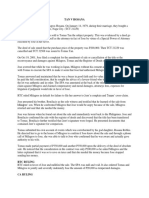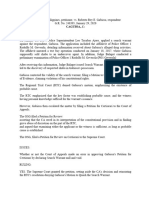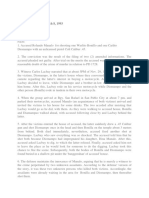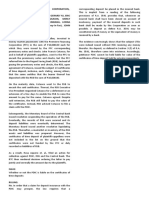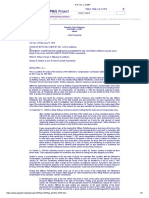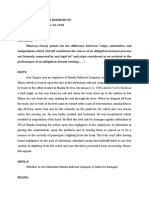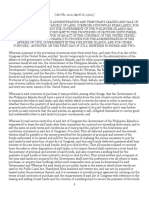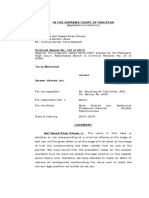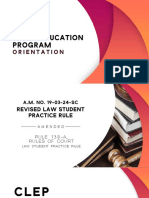Murder, G.R. No. 227195, 07292019 - SET A
Murder, G.R. No. 227195, 07292019 - SET A
Uploaded by
hannahCopyright:
Available Formats
Murder, G.R. No. 227195, 07292019 - SET A
Murder, G.R. No. 227195, 07292019 - SET A
Uploaded by
hannahCopyright
Available Formats
Share this document
Did you find this document useful?
Is this content inappropriate?
Copyright:
Available Formats
Murder, G.R. No. 227195, 07292019 - SET A
Murder, G.R. No. 227195, 07292019 - SET A
Uploaded by
hannahCopyright:
Available Formats
PEOPLE OF THE PHILIPPINES, v.
FABIAN MABALATO@ "BOY," JULIO CARTUCIANO
and ALLAN CANATOY@"ALLAN EDWARD,"
G.R. No. 227195, July 29, 2019
Caguioa, J.:
DOCTRINE:
Direct evidence is not indispensable for conviction in criminal cases and that
circumstantial evidence may be enough to support a court's decision of guilt. Settled
is the rule that extra judicial confessions, to be admissible in evidence, must be: 1)
voluntary; 2) made with the assistance of a competent and independent counsel; 3)
express; and 4) in writing.
There is treachery when the offender commits any of the crimes against the
person, employing means, methods or forms in the execution thereof which tend
directly and specially to insure its execution, without risk to himself arising from the
defense which the offended party might make.
FACTS:
Accused-appellant Canatoy, including Mabalato, Cartuciano and Sato, was charged
with the crime of Murder under Article 248 of the Revised Penal Code (RPC). Records
showed that on September 4, 2002, Barbas got into an argument with accused Sato due to
the amount owed by the latter to the former. On the same day, at the time of Barbas’ death,
Tan and Soliman saw both accused Mabalato and Canatoy were fleeing from Barbas’ room.
Thus, the police apprehended the four accused. Thereafter, Mabalato and Cartuciano
executed their extrajudicial confessions with the assistance of a counsel. In Mabalato’s
sworn statement, he admitted that he and Canatoy were hired by accused Cartuciano to kill
the victim for a consideration. In Cartuciano’s sworn statement he implicated Sato as the
one who requested for the killing of the victim. Thus, Cartuciano, Mabalato and Canatoy
were the ones who devised the killing of the victim. The prosecution's case rests mainly on:
1) the testimonies of witnesses Soliman and Tan; and 2) the extrajudicial confessions of
Cartuciano and the d Mabalato. The RTC court gave credence to the testimonies of
witnesses Tan and Soliman as circumstantial evidence for there is no direct evidence that
could point the accused, and admitted the extra-judicial confessions of accused Mabalato
and Cartuciano, for said sworn statements were voluntarily given and the safeguards to
their admissibility were sufficiently addressed, thereby convicting Cartuciano, Mabalato
and Canatoy of crime of murder and acquitting Sato for the only proof which tied her to the
crime is Cartuciano's extra-judicial confession which, according to the trial court, should be
binding only on the confessant. Consequently, upon appeal, the CA affirmed the trial court's
conviction with modification as to the sentence and damages awarded. Due to Mabalato's
death, his criminal and civil liabilities were extinguished.
ISSUE/S:
Whether accused Allan Canatoy is guilty beyond reasonable of the crime of murder.
RULING:
Yes, the Court rules that these pieces of evidence were sufficient to prove beyond
reasonable doubt that Canatoy, along with his other co-accused and in conspiracy with one
another, committed the crime charged. Although, there was no direct evidence but not only
circumstantial evidence, through the witnesses’ testimonies, it is settled, that direct evidence
is not indispensable for conviction in criminal cases and that circumstantial evidence may be
enough to support a court's decision of guilt. Also, both Soliman and Tan identified in open
court the two accused, Canatoy and Mabalato, as the men running away from the crime
scene. Moreover, the Court found that all the requirements for the extra judicial confessions
to be admissible in evidence such as 1) voluntary, 2) made with the assistance of a competent
and independent counsel, 3) express, and 4) in writing, are all obtained in this case.
The prosecution contended that the killing was aggravated by treason, evident
premeditation and abuse of superior strength. However, the Court dismissed the alleged
killing of the victim in a treachery manner since there is no witness or proof was presented by
the prosecution on the manner the killing was executed, particularly if Barbas was attacked
unexpectedly and suddenly or if she had any opportunity to defend herself or if the means by
which she was killed were consciously adopted. And the Court affirmed the findings of the
trial court and CA that the killing of Barbas was qualified by the circumstances of evident
premeditation and abuse of superior strength. Hence, the crime remains to be Murder under
Article 248 of the RPC, the elements of which are: (1) that a person was killed; (2) that the
accused killed him; (3) that the killing was attended by any of the qualifying circumstances
mentioned in Art. 248; and (4) that the killing is not parricide or infanticide.
You might also like
- Script Arraignment and Pre-TrialDocument10 pagesScript Arraignment and Pre-TrialMarie80% (10)
- Intestate Estate of The Deceased Luz Garcia. Pablo G. UTULO, Applicant-Appellee, VsDocument75 pagesIntestate Estate of The Deceased Luz Garcia. Pablo G. UTULO, Applicant-Appellee, VsMary Carmille DauloNo ratings yet
- People v. Olarte (Pamatmat)Document4 pagesPeople v. Olarte (Pamatmat)Mikaela PamatmatNo ratings yet
- Annulment of Judgment CamoDocument12 pagesAnnulment of Judgment CamoRamon Carlos PalomaresNo ratings yet
- Insurance Possible QaDocument5 pagesInsurance Possible QademNo ratings yet
- People Vs MagnoDocument2 pagesPeople Vs MagnoJan Christiane Maningo SaleNo ratings yet
- Mayuga V AtienzaDocument8 pagesMayuga V AtienzaJuralexNo ratings yet
- Chain of Custody 1. People Vs Anita MiranbaDocument1 pageChain of Custody 1. People Vs Anita MiranbaLoi Molina LopenaNo ratings yet
- People of The Philippines vs. Edison C. MagbitangDocument2 pagesPeople of The Philippines vs. Edison C. MagbitangMarco LucmanNo ratings yet
- DNA EVIDENCE-CalmaVsTurlaDocument1 pageDNA EVIDENCE-CalmaVsTurlaBenjo Romil NonoNo ratings yet
- D2b - 5 People v. PadrigoneDocument2 pagesD2b - 5 People v. PadrigoneAaron AristonNo ratings yet
- Affidavit, Paraffin Test - docx-NCDocument1 pageAffidavit, Paraffin Test - docx-NCAmado Vallejo IIINo ratings yet
- Tan V HosanaDocument2 pagesTan V HosanaMark Joseph M. VirgilioNo ratings yet
- People v. SaceDocument2 pagesPeople v. SaceKevin KhoNo ratings yet
- 119 People v. IrangDocument2 pages119 People v. IrangPatricia Kaye O. SevillaNo ratings yet
- Heirs of Leandro Natividad v. Mauricio-NatividadDocument3 pagesHeirs of Leandro Natividad v. Mauricio-NatividadVina CeeNo ratings yet
- Norse Managament v. National Seaman BoardDocument2 pagesNorse Managament v. National Seaman BoardBenina BautistaNo ratings yet
- NFrondarina V MalazarteDocument2 pagesNFrondarina V MalazarteJudy RiveraNo ratings yet
- People Vs LangcuaDocument1 pagePeople Vs LangcuaTootsie Guzma100% (1)
- BSB Group V Sally GoDocument3 pagesBSB Group V Sally GoVerne SagunNo ratings yet
- Miro Vs Vda de ErederosDocument13 pagesMiro Vs Vda de ErederosRosalie CastroNo ratings yet
- People V SamusDocument15 pagesPeople V SamusTon Ton CananeaNo ratings yet
- Specpro Cases 9-15Document13 pagesSpecpro Cases 9-15Genevieve BermudoNo ratings yet
- People vs. ManaloDocument115 pagesPeople vs. ManaloMariline LeeNo ratings yet
- III. Violation of R.A 9165 Involving A MinorDocument3 pagesIII. Violation of R.A 9165 Involving A MinorIrish MartinezNo ratings yet
- Rule 130 Sec 39Document17 pagesRule 130 Sec 39Therese JavierNo ratings yet
- Republic v. Science Park of The Philippines, Inc.Document9 pagesRepublic v. Science Park of The Philippines, Inc.Lois DimaanoNo ratings yet
- Information: Regional Trial CourtDocument2 pagesInformation: Regional Trial CourtBo Dist100% (1)
- People of The Philippines Vs GabiosaDocument2 pagesPeople of The Philippines Vs Gabiosazafi nahNo ratings yet
- Zabala-V-People-Of-The-Philippines 2Document2 pagesZabala-V-People-Of-The-Philippines 2Dianne AquinoNo ratings yet
- People Vs MalimitDocument1 pagePeople Vs Malimitrouella s guayNo ratings yet
- 081 People v. LadaoDocument2 pages081 People v. LadaoKoko GalinatoNo ratings yet
- PEOPLE OF THE PHILIPPINES Vs Malimit 264 SCRA 167Document3 pagesPEOPLE OF THE PHILIPPINES Vs Malimit 264 SCRA 167ecalotaNo ratings yet
- City of Manila vs. Del RosarioDocument2 pagesCity of Manila vs. Del RosarioDon Dela Chica100% (1)
- How Are You Related To This Case?Document5 pagesHow Are You Related To This Case?Alex GraciaNo ratings yet
- Te SpotDocument1 pageTe SpotAngel Vicente EsquidaNo ratings yet
- Opic in Yllabus Ummary: Sulit Page 1 of 2Document2 pagesOpic in Yllabus Ummary: Sulit Page 1 of 2Alexis Elaine BeaNo ratings yet
- Plaintiff.: Judicial Affidavit of Dr. Juan de La CruzDocument4 pagesPlaintiff.: Judicial Affidavit of Dr. Juan de La Cruzbthsecurity agencyNo ratings yet
- People V ManaloDocument2 pagesPeople V ManaloJack Pabalan Delos SantosNo ratings yet
- People Vs de Guzman (Impeachmet)Document5 pagesPeople Vs de Guzman (Impeachmet)Dennis VelasquezNo ratings yet
- A.C. No. 10483, - THE CHRISTIAN SPIRITISTS IN THE PHILIPPINES, INC. v. ATTY. DANIEL D. MANGALLAYDocument35 pagesA.C. No. 10483, - THE CHRISTIAN SPIRITISTS IN THE PHILIPPINES, INC. v. ATTY. DANIEL D. MANGALLAYDennis Jay A. ParasNo ratings yet
- RULE 129 General ReviewerDocument5 pagesRULE 129 General ReviewerVon Paulo Padilla AnonuevoNo ratings yet
- 14 23 B People Vs TeehankeeDocument6 pages14 23 B People Vs TeehankeeAAMCNo ratings yet
- TRANSPORTATION LAW NOTES 2020 Prelim To MidtermDocument8 pagesTRANSPORTATION LAW NOTES 2020 Prelim To MidtermAnisah AquilaNo ratings yet
- Sanson VS CA CASE DIGESTDocument1 pageSanson VS CA CASE DIGESTJoyciie ContrerasNo ratings yet
- 033 Alvarez V. Ramirez (See)Document12 pages033 Alvarez V. Ramirez (See)Rostum AgapitoNo ratings yet
- Yap vs. Lagtapon DigestDocument1 pageYap vs. Lagtapon DigestfreezoneNo ratings yet
- PDIC Vs AqueroDocument1 pagePDIC Vs AqueroRamon Khalil Erum IVNo ratings yet
- Nepomuceeno Vs CA 139 SCRA 206Document12 pagesNepomuceeno Vs CA 139 SCRA 206SSNo ratings yet
- Patula v. PeopleDocument3 pagesPatula v. PeopleLourdes LescanoNo ratings yet
- Al-Adsani v. UK PDFDocument4 pagesAl-Adsani v. UK PDFWayne Michael NoveraNo ratings yet
- Entries in Official RecordsDocument9 pagesEntries in Official Recordscmv mendozaNo ratings yet
- 20 Cabang v. DelfinadoDocument2 pages20 Cabang v. DelfinadoNico GeraldezNo ratings yet
- Rape, G.R. No. 235662, 07242019 - SET ADocument2 pagesRape, G.R. No. 235662, 07242019 - SET AhannahNo ratings yet
- Tarapen V People DigestDocument6 pagesTarapen V People DigestJudy Ann ShengNo ratings yet
- Suerte-Felipe v. People March 3, 2008 Chico-Nazario, J. Digest By: Kara Marcelo FactsDocument3 pagesSuerte-Felipe v. People March 3, 2008 Chico-Nazario, J. Digest By: Kara Marcelo FactsJoshua AbadNo ratings yet
- In The Matter of The Testate Estate of Edward ChristensenDocument3 pagesIn The Matter of The Testate Estate of Edward ChristensenJaneen ZamudioNo ratings yet
- SPLDocument4 pagesSPLAngela HernalNo ratings yet
- Final Scrimp Rob Lock A Pen A Clemente ADocument5 pagesFinal Scrimp Rob Lock A Pen A Clemente Aemen penaNo ratings yet
- CASE #17 People of The Philippines Vs Fabian Mabalato, Julio Cartuciano and Allan Canatoy G.R. No. 227195 July 29, 2019 FactsDocument1 pageCASE #17 People of The Philippines Vs Fabian Mabalato, Julio Cartuciano and Allan Canatoy G.R. No. 227195 July 29, 2019 FactsHarlene HemorNo ratings yet
- Plaintiff-Appellee, Vs Vs Accused-Appellant The Solicitor General Hermel R. Marantal Reolo Gutierrez Law OfficeDocument36 pagesPlaintiff-Appellee, Vs Vs Accused-Appellant The Solicitor General Hermel R. Marantal Reolo Gutierrez Law OfficeSiegfred G. PerezNo ratings yet
- 2 PP Vs Bato Case DigestDocument1 page2 PP Vs Bato Case DigestRicaNo ratings yet
- Imperial v. JosonDocument2 pagesImperial v. JosonhannahNo ratings yet
- Sabena Belgian World Airlines v. CADocument2 pagesSabena Belgian World Airlines v. CAhannahNo ratings yet
- 6 G.R. No. L-31284Document3 pages6 G.R. No. L-31284hannahNo ratings yet
- 1 G.R. No. L-21969Document3 pages1 G.R. No. L-21969hannahNo ratings yet
- 8 G.R. No. 176389 - G.R. No. 176864Document69 pages8 G.R. No. 176389 - G.R. No. 176864hannahNo ratings yet
- 4 G.R. No. 171536Document6 pages4 G.R. No. 171536hannahNo ratings yet
- Supreme Court: The Solicitor General For Plaintiff-Appellee. Antonio F. Dasalla For Accussed-AppellantDocument4 pagesSupreme Court: The Solicitor General For Plaintiff-Appellee. Antonio F. Dasalla For Accussed-AppellanthannahNo ratings yet
- 3 G.R. No. 70836Document5 pages3 G.R. No. 70836hannahNo ratings yet
- Constitution Statutes Executive Issuances Judicial Issuances Other Issuances Jurisprudence International Legal Resources AUSL ExclusiveDocument6 pagesConstitution Statutes Executive Issuances Judicial Issuances Other Issuances Jurisprudence International Legal Resources AUSL ExclusivehannahNo ratings yet
- 9 G.R. Nos. 138874-75Document6 pages9 G.R. Nos. 138874-75hannahNo ratings yet
- G.R. No. 167622 2Document13 pagesG.R. No. 167622 2hannahNo ratings yet
- Case AnalysisDocument2 pagesCase AnalysishannahNo ratings yet
- JOSE CANGCO vs. MANILA RAILROAD CODocument3 pagesJOSE CANGCO vs. MANILA RAILROAD COhannahNo ratings yet
- G.R. No. 84484Document4 pagesG.R. No. 84484hannahNo ratings yet
- 3 G.R. No. 205260Document6 pages3 G.R. No. 205260hannahNo ratings yet
- Cases 10-12Document6 pagesCases 10-12hannahNo ratings yet
- G.R. No. 167622Document2 pagesG.R. No. 167622hannah0% (1)
- Act No 1120 FRIAR LANDS ACTDocument6 pagesAct No 1120 FRIAR LANDS ACThannahNo ratings yet
- G.R. No. 84484Document2 pagesG.R. No. 84484hannahNo ratings yet
- Murder, G.R. No. 216936, 07292019 - SET ADocument2 pagesMurder, G.R. No. 216936, 07292019 - SET AhannahNo ratings yet
- G.R. No. 119930Document3 pagesG.R. No. 119930hannahNo ratings yet
- Rape, G.R. No. 224597, 07292019 - SET ADocument2 pagesRape, G.R. No. 224597, 07292019 - SET AhannahNo ratings yet
- Murder, G.R. No. 223512, 07242019 - SET ADocument3 pagesMurder, G.R. No. 223512, 07242019 - SET AhannahNo ratings yet
- Falsification of Public Document, G.R. No. 205260, 07292019Document2 pagesFalsification of Public Document, G.R. No. 205260, 07292019hannah100% (1)
- Rape, G.R. No. 235662, 07242019 - SET ADocument2 pagesRape, G.R. No. 235662, 07242019 - SET AhannahNo ratings yet
- Tax On Educational InstitutionDocument16 pagesTax On Educational InstitutionhannahNo ratings yet
- Motion For Injunction and Restraining To Block Judge Scott Miller From Revoking Neighbors Drivers Licenses.Document3 pagesMotion For Injunction and Restraining To Block Judge Scott Miller From Revoking Neighbors Drivers Licenses.Guy Madison NeighborsNo ratings yet
- Estrada Vs DesiertoDocument3 pagesEstrada Vs DesiertoCHARM BARCELONo ratings yet
- Moncupa Vs Enrile Digest 1Document1 pageMoncupa Vs Enrile Digest 1Tina TinsNo ratings yet
- US v. Pablo, 35 Phil 94 (1916)Document10 pagesUS v. Pablo, 35 Phil 94 (1916)Esz ChuaNo ratings yet
- 8th Ss Unit 5 Study Guide KeyDocument4 pages8th Ss Unit 5 Study Guide KeyHarrison FlowerNo ratings yet
- Virata vs. OchoaDocument3 pagesVirata vs. OchoaBeverlyn JamisonNo ratings yet
- Pagpapaunlad NG PamayananDocument22 pagesPagpapaunlad NG PamayananCamille GrefaldiaNo ratings yet
- Videos: SDFSDFSDF SDFSDFSDF SDFSDFSDFDocument2 pagesVideos: SDFSDFSDF SDFSDFSDF SDFSDFSDFSuman_SamadderNo ratings yet
- Syllabus 13c Roasdfbin KelleyDocument6 pagesSyllabus 13c Roasdfbin KelleyblahgzNo ratings yet
- RPSC RtiDocument54 pagesRPSC Rtiavikrishna1No ratings yet
- 2001 SCMR 795Document4 pages2001 SCMR 795Mudasar SahmalNo ratings yet
- In The Supreme Court of Pakistan: Tariq MehmoodDocument12 pagesIn The Supreme Court of Pakistan: Tariq Mehmoodzahids2kNo ratings yet
- G.R. No. 74145 June 17, 1987 People Versus Zosimo Crisologo, Alias "Amang"Document25 pagesG.R. No. 74145 June 17, 1987 People Versus Zosimo Crisologo, Alias "Amang"James PeregrinoNo ratings yet
- Burke SorensonDocument7 pagesBurke SorensonoaklocNo ratings yet
- Evidence Law WorkDocument8 pagesEvidence Law Workkelvin kanondoNo ratings yet
- THE PEOPLE OF THE PHILIPPINES, Plaintiff-Appellee, vs. ANTONIO Z. OANIS and ALBERTO GALANTA, Defendants-AppellantsDocument7 pagesTHE PEOPLE OF THE PHILIPPINES, Plaintiff-Appellee, vs. ANTONIO Z. OANIS and ALBERTO GALANTA, Defendants-AppellantsDanica Bianca CagalawanNo ratings yet
- Jeffrey Perez ResumeDocument1 pageJeffrey Perez Resumeapi-313268698No ratings yet
- Concept Paper Template Project Citizen-Topic Proposal No. 1Document11 pagesConcept Paper Template Project Citizen-Topic Proposal No. 1Lovely De CastroNo ratings yet
- CLEP OrientationDocument30 pagesCLEP OrientationFrancis Moraleda100% (1)
- Sindh Local Government Act 2013 A4 Mar 2 2015Document150 pagesSindh Local Government Act 2013 A4 Mar 2 2015Ramzan Ali100% (1)
- Comm 3p15 - Research PaperDocument19 pagesComm 3p15 - Research Paperapi-302726243No ratings yet
- U.S. v. SerapioDocument2 pagesU.S. v. SerapioVince Michael OngNo ratings yet
- United States v. Dominic Mariani, 851 F.2d 595, 2d Cir. (1988)Document10 pagesUnited States v. Dominic Mariani, 851 F.2d 595, 2d Cir. (1988)Scribd Government DocsNo ratings yet
- Briana L. Harvath ResumeDocument3 pagesBriana L. Harvath ResumeBriana HarvathNo ratings yet
- M Chapter-V Epistolary and Creeping Jusrisdicitons of The Su PDFDocument30 pagesM Chapter-V Epistolary and Creeping Jusrisdicitons of The Su PDFNavneet SinghrolNo ratings yet
- Revlist 2Document3 pagesRevlist 2mohitmatsya16No ratings yet
- Bail Decided On MeritsDocument5 pagesBail Decided On MeritsHaseeb Khalid ChauhanNo ratings yet
- MARKET LIBERALISM-webPDF PDFDocument423 pagesMARKET LIBERALISM-webPDF PDFrtfirefly168No ratings yet












